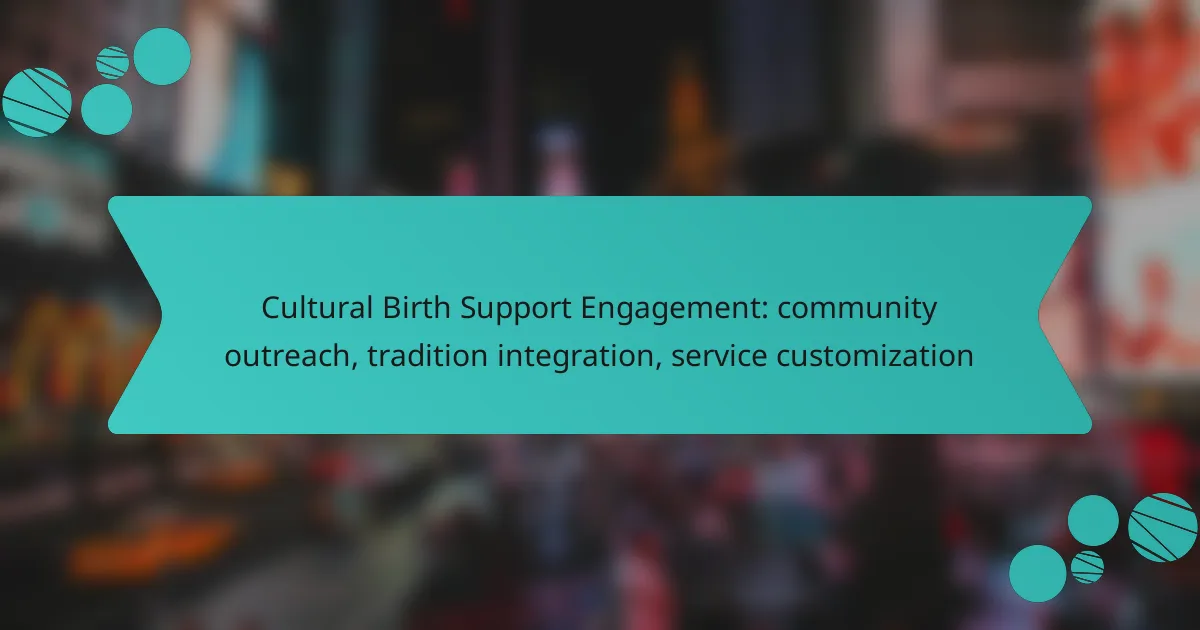Effective cultural birth support relies on community outreach to raise awareness and build trust among diverse populations. By integrating traditional practices and customizing services, providers can create a supportive environment that respects and honors the unique cultural needs of families during the birthing process.
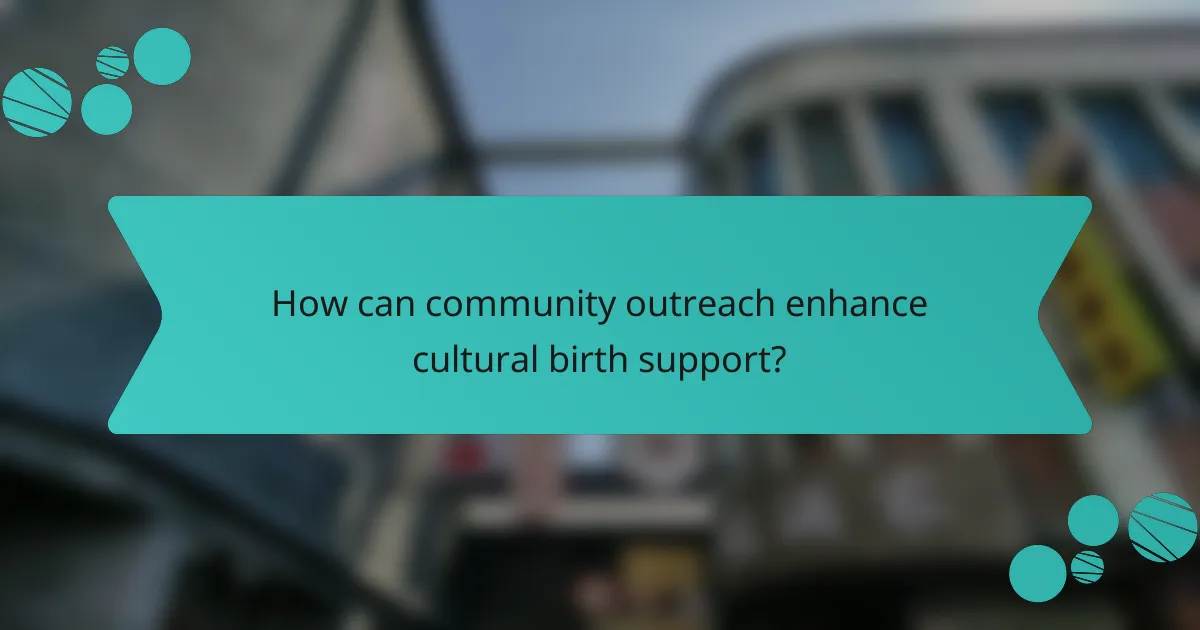
How can community outreach enhance cultural birth support?
Community outreach can significantly enhance cultural birth support by increasing awareness of available services and fostering trust among diverse populations. Engaging with communities allows for the integration of traditional practices and the customization of services to meet specific cultural needs.
Increased awareness of services
Raising awareness about birth support services is crucial for ensuring that expectant families know their options. Outreach initiatives can include informational sessions, social media campaigns, and community newsletters that highlight available resources. By actively promoting these services, organizations can reach a wider audience and encourage participation.
For example, hosting open houses or information fairs can provide families with direct access to service providers, enabling them to ask questions and learn about culturally relevant practices.
Building trust within communities
Trust is essential for effective birth support, particularly in culturally diverse communities. Outreach efforts that involve community leaders and respected figures can help bridge gaps and build rapport. By demonstrating commitment to understanding and respecting cultural values, organizations can foster a sense of safety and support among families.
Engaging in active listening and incorporating feedback from community members can further enhance trust and ensure that services are aligned with cultural expectations.
Collaborative events and workshops
Organizing collaborative events and workshops can provide valuable opportunities for education and connection. These gatherings can focus on topics such as prenatal care, traditional birthing practices, and postpartum support, allowing families to learn from both professionals and peers.
Workshops that include hands-on activities or discussions can empower participants to share their experiences and knowledge, creating a supportive learning environment.
Partnerships with local organizations
Forming partnerships with local organizations can strengthen outreach efforts and expand the range of services offered. Collaborating with health clinics, cultural centers, and non-profits can enhance resource sharing and create a more comprehensive support network for families.
These partnerships can also facilitate joint events, allowing for a more diverse array of services and perspectives to be presented to the community.
Access to diverse resources
Community outreach can improve access to a variety of resources that cater to different cultural needs. By identifying and promoting local resources such as doulas, midwives, and cultural competency training, organizations can help families find the support they need.
Additionally, creating a centralized resource directory can make it easier for families to navigate available options and connect with culturally appropriate services.
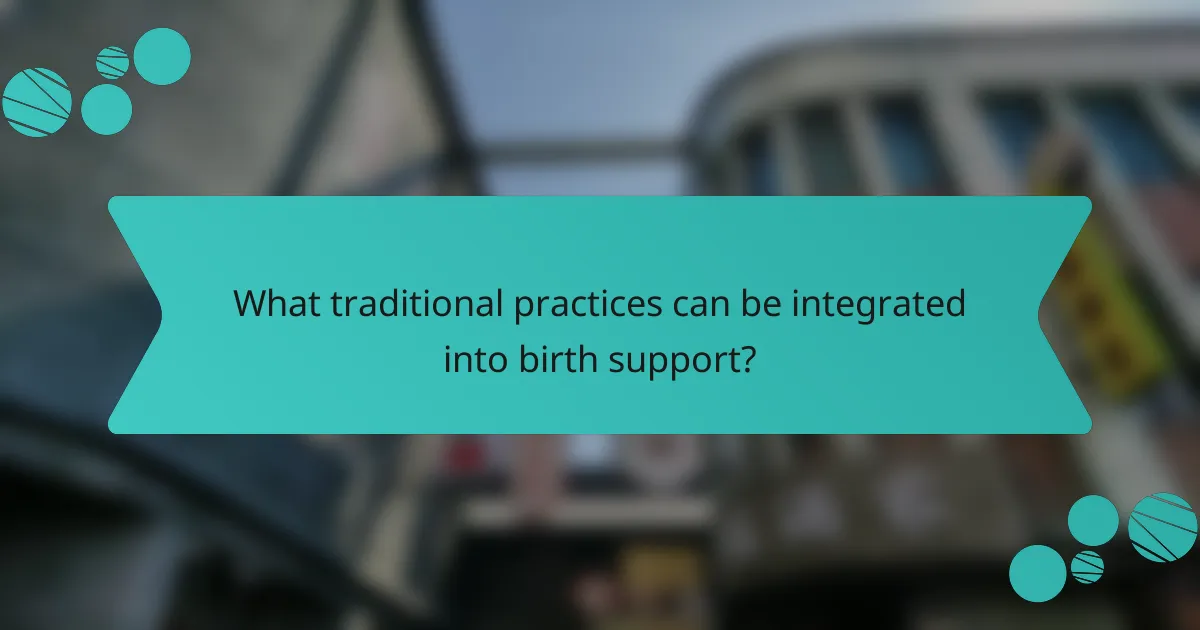
What traditional practices can be integrated into birth support?
Integrating traditional practices into birth support involves incorporating cultural rituals, healing methods, and community engagement to enhance the birthing experience. These practices can provide emotional comfort, spiritual connection, and a sense of belonging for families during this significant life event.
Incorporating cultural rituals
Cultural rituals play a vital role in birth support by fostering a sense of identity and continuity. These can include specific ceremonies or blessings performed before, during, or after childbirth, which may vary widely among different cultures.
For example, some cultures may have a ritual bath for the mother and newborn, while others might include a naming ceremony shortly after birth. Engaging families in these rituals can strengthen their connection to their heritage and provide emotional support.
Utilizing traditional healing methods
Traditional healing methods can complement modern medical practices in birth support. Techniques such as herbal remedies, massage, and acupuncture are often used to alleviate discomfort during labor and promote recovery postpartum.
It’s essential to consult with healthcare providers to ensure these methods are safe and effective. For instance, using ginger tea for nausea or specific essential oils for relaxation can be beneficial, but should be approached with care and professional guidance.
Engaging elder community members
Elder community members often hold valuable knowledge about traditional practices and can provide wisdom and support during the birthing process. Their involvement can help bridge the gap between generations, offering reassurance and guidance to new parents.
Encouraging elders to share their experiences and participate in the birthing process can create a supportive environment. This might include storytelling, sharing traditional songs, or offering advice based on their own experiences, which can enrich the family’s journey.
Celebrating cultural milestones
Celebrating cultural milestones related to birth can enhance the overall experience for families. These celebrations may include specific events or gatherings that honor the new life and the family’s cultural heritage.
For instance, hosting a community feast or a gathering of family and friends to celebrate the newborn can reinforce social bonds and provide emotional support. Recognizing these milestones helps families feel connected to their culture and community, making the transition into parenthood more meaningful.
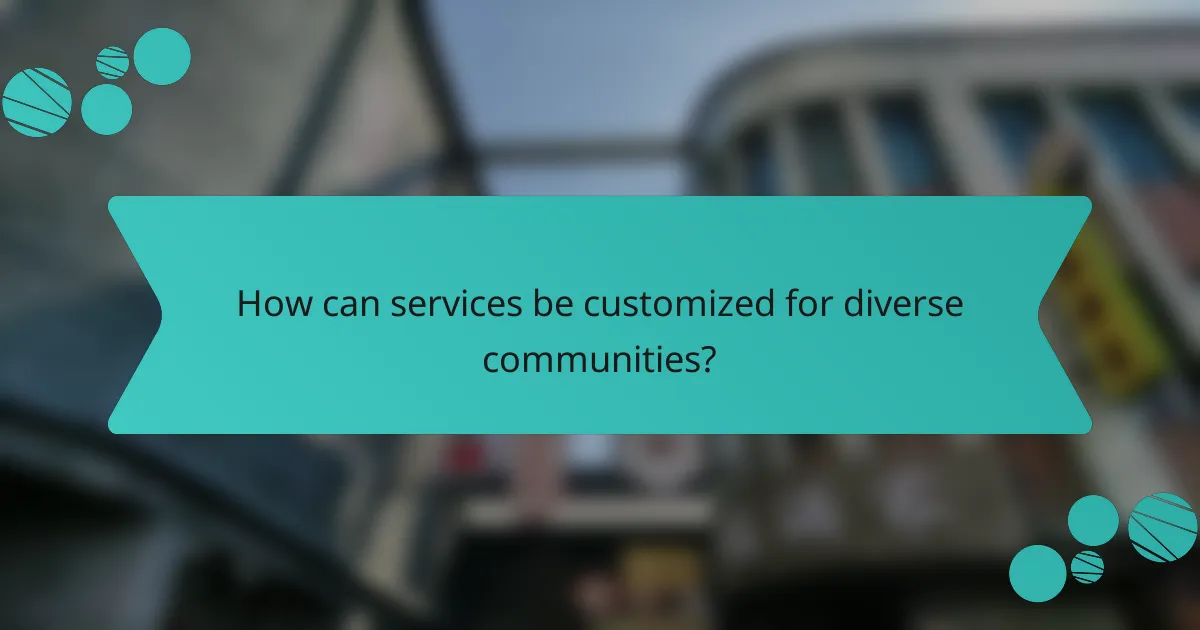
How can services be customized for diverse communities?
Services can be customized for diverse communities by tailoring care approaches to meet the unique cultural, linguistic, and logistical needs of each group. This involves understanding community traditions, preferences, and barriers to access, ensuring that support is relevant and effective.
Personalized care plans
Personalized care plans are essential for addressing the specific needs of individuals within diverse communities. These plans should incorporate cultural beliefs, family dynamics, and personal preferences to ensure that care is respectful and effective. For example, a care plan for a family from a specific cultural background may include traditional practices alongside modern medical advice.
To create effective personalized care plans, providers should engage with community leaders and members during the planning process. This collaboration can help identify key cultural practices that should be integrated into the care plan.
Language and communication adaptations
Language and communication adaptations are crucial for effective engagement with diverse communities. Providing services in the preferred language of clients can significantly enhance understanding and comfort. This may involve hiring bilingual staff or using translation services to ensure clear communication.
Additionally, adapting communication styles to fit cultural norms can improve rapport. For instance, some cultures may prefer indirect communication, while others value directness. Training staff to recognize and respect these differences can lead to better service delivery.
Flexible service delivery options
Flexible service delivery options allow communities to access support in ways that fit their lifestyles and preferences. This could include offering services at various times, such as evenings or weekends, to accommodate work schedules. Mobile services or telehealth options can also be beneficial for those with transportation challenges.
Providers should consider the specific logistical barriers faced by different communities. For instance, rural populations may require more mobile services, while urban communities might benefit from centralized locations with extended hours.
Feedback mechanisms for continuous improvement
Implementing feedback mechanisms is vital for ensuring that services remain relevant and effective for diverse communities. Regular surveys, focus groups, or community meetings can provide valuable insights into client experiences and satisfaction levels. This information can guide necessary adjustments to services.
It is important to create a safe environment for feedback, where community members feel comfortable sharing their thoughts. Anonymity in surveys or open forums can encourage honest communication, leading to more effective service customization over time.
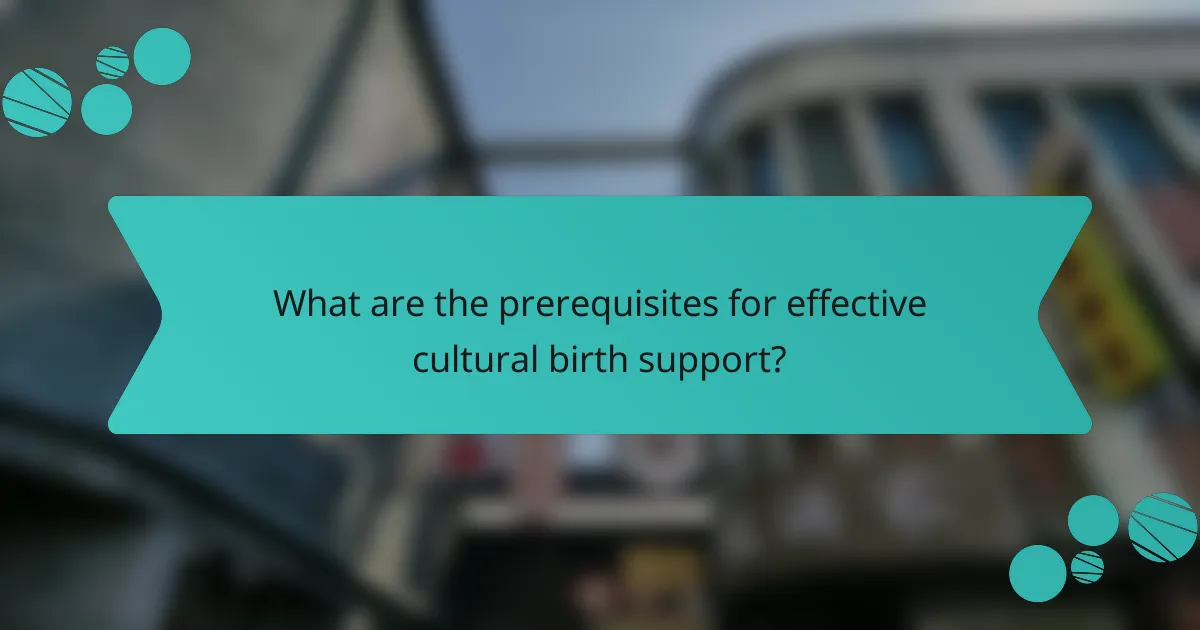
What are the prerequisites for effective cultural birth support?
Effective cultural birth support requires understanding the unique needs of diverse communities and integrating traditional practices into modern care. This involves customizing services to respect cultural beliefs while ensuring safety and accessibility for all families.
Understanding community demographics
To provide effective cultural birth support, it’s essential to understand the demographics of the community being served. This includes factors such as ethnicity, language, socioeconomic status, and prevalent cultural practices surrounding childbirth.
Gathering demographic data can help identify specific needs and preferences. For example, a community with a high percentage of non-English speakers may require multilingual support staff or translated materials to ensure clear communication during the birthing process.
Training for cultural competency
Training for cultural competency is crucial for birth support providers to effectively engage with diverse populations. This training should cover cultural beliefs about childbirth, communication styles, and the importance of respecting traditional practices.
Providers should participate in workshops or courses that emphasize empathy and understanding. For instance, learning about specific rituals or dietary restrictions can enhance the support offered to families during labor and delivery.
